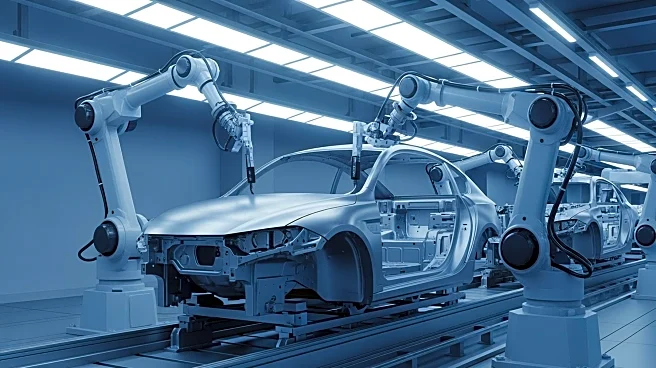What's Happening?
Tesla has confirmed that production of its autonomous ride-hailing vehicle, the Cybercab, will begin in April 2026. This announcement was made by CEO Elon Musk during the company's annual shareholder meeting,
providing a more precise timeline than the previously indicated second quarter of 2026. The Cybercab is designed specifically for autonomous operation, featuring Tesla's latest Full Self-Driving hardware and a cabin tailored for robotaxi use, lacking traditional controls like a steering wheel or pedals. Alongside the production timeline, Tesla unveiled its next-generation unboxed manufacturing system, which builds major sections of the vehicle in parallel, reducing factory footprint, speeding up production, and cutting costs. This innovative approach allows for rapid reconfiguration of production lines as Tesla scales new vehicles, potentially achieving a production cycle time of less than ten seconds per unit.
Why It's Important?
The start of Cybercab production marks a significant milestone for Tesla in the autonomous vehicle market, potentially reshaping the ride-hailing industry. By integrating advanced Full Self-Driving technology, Tesla aims to offer a fully autonomous transportation solution, which could reduce reliance on human drivers and lower operational costs for ride-hailing services. The unboxed manufacturing system represents a leap forward in automotive production efficiency, enabling Tesla to scale its operations rapidly and meet growing demand for electric and autonomous vehicles. This development could strengthen Tesla's position as a leader in the EV market and influence industry standards for vehicle production and autonomous technology.
What's Next?
As Tesla prepares for the Cybercab production start in April 2026, the company will likely focus on refining its manufacturing processes and ensuring the readiness of its Full Self-Driving technology. Stakeholders, including investors and industry analysts, will be watching closely to see how Tesla's innovative production methods impact its ability to meet production targets and deliver on its autonomous vehicle promises. The success of the Cybercab could prompt other automakers to adopt similar manufacturing techniques and accelerate the development of autonomous ride-hailing solutions.
Beyond the Headlines
Tesla's approach to manufacturing and autonomous vehicle design could have broader implications for the automotive industry, potentially setting new benchmarks for efficiency and innovation. The shift towards fully autonomous vehicles may raise ethical and regulatory questions regarding safety, liability, and the impact on employment in the transportation sector. As Tesla continues to push the boundaries of technology, it may also influence public perception and acceptance of autonomous vehicles, shaping future transportation policies and infrastructure development.











